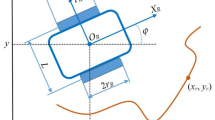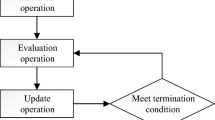Abstract
In this paper, the authors tackle a fixed-time average-tracking problem for multi-agent systems which do not require velocity measurements and are affected by external mismatched and matched disturbances. The objective requires the considered agents with second-order dynamics to follow the average value of several time-varying reference signals, each of which is acquired by only one agent. First of all, the average value is estimated by using a novel distributed average estimator in a fixed time. Second, an original observer is created to provide estimated values in a fixed time for external mismatched and matched disturbances as well as unmeasured velocities of agents. Then, the authors propose a novel fixed-time anti-disturbance average-tracking protocol with the aid of the observer and a sliding mode surface. In the end, the feasibility of theoretical analysis is illustrated by some simulation experiments.
Similar content being viewed by others
References
Ekanayake S W and Pathirana P N, Smart cluster bombs-control of multi-agent systems for military applications, Proceedings of 2007 IEEE International Conference on Networking, Sensing and Control, London, 2007.
Chen H L, Agricultural supply chain traceability system based on multi-agent system, Asian Agricultural Research, 2011, 3(10): 42–45, 49.
Miftah E, Sayouti A, and Medromi H, Multi-agent systems and its application to control vehicle underwater, International Journal of Applied Information Systems, 2015, 9(7): 29–38.
Liu C L and Liu F, Stationary consensus of heterogeneous multi-agent systems with bounded communication delays, Automatica, 2011, 47(9): 2130–2133.
Yang H Y, Guo L, and Zou H L, Robust consensus of multi-agent systems with time-delays and exogenous disturbances, International Journal of Control, Automation and Systems, 2012, 10(4): 797–805.
Briñón-Arranz L, Seuret A, and Canudas-de-Wit C, Cooperative control design for time-varying formations of multi-agent systems, IEEE Transactions on Automatic Control, 2014, 59(8): 2283–2288.
Movric K H and Lewis F L, Cooperative optimal control for multi-agent systems on directed graph topologies, IEEE Transactions on Automatic Control, 2014, 59(3): 769–774.
Liu C L, Shan L, Chen Y Y, et al., Average-consensus filter of first-order multi-agent systems with disturbances, IEEE Transactions on Circuits and Systems II: Express Briefs, 2017, 65(11): 1763–1767.
Ghapani S, Rahili S, and Ren W, Distributed average tracking for second-order agents with nonlinear dynamics, Proceedings of 2016 American Control Conference (ACC), Boston, 2016.
Zhao Y, Liu Y F, Li Z K, et al., Distributed average tracking for multiple signals generated by linear dynamical systems: An edge-based framework, Automatica, 2017, 75: 158–166.
Zhao Y, Liu Y F, Wen G H, et al., Distributed average tracking for lipschitz-type of nonlinear dynamical systems, IEEE Transactions on Cybernetics, 2018, 49(12): 4140–4152.
Chen F, Cao Y C, and Ren W, Distributed average tracking of multiple time-varying reference signals with bounded derivatives, IEEE Transactions on Automatic Control, 2012, 57(12): 3169–3174.
Chen F, Ren W, Lan W Y, et al., Distributed average tracking for reference signals with bounded accelerations, IEEE Transactions on Automatic Control, 2015, 60(3): 863–869.
Ghapani S, Rahili S, and Ren W, Distributed average tracking of physical second-order agents with heterogeneous unknown nonlinear dynamics without constraint on input signals, IEEE Transactions on Automatic Control, 2018, 64(3): 1178–1184.
Liu C L, Shan L, Zhang Y, et al., Hierarchical average-tracking algorithm for multi-agent systems with unmatched constant references signals, IEEE Transactions on Circuits and Systems II: Express Briefs, 2020, 67(11): 2642–2646.
Liu C L, Li H, and Shan L, Stationary average-tracking problem of unmatched constant reference signals based on delayed-state feedback, International Journal of Systems Science, 2021, 52(13): 2725–2734.
Zhao Y, Liu Y F, Wen G H, et al., Finite-time distributed average tracking for second-order nonlinear systems, IEEE Transactions on Neural Networks and Learning Systems, 2019, 30(6): 1780–1789.
Hong H F, Wen G H, Yu X H, et al., Robust distributed average tracking for disturbed second-order multi-agent systems, IEEE Transactions on Systems, Man, and Cybernetics: Systems, 2022, 52(5): 3187–3199.
Andrieu V, Praly L, and Astolfi A, Homogeneous approximation, recursive observer design, and output feedback, SIAM Journal on Control and Optimization, 2008, 47(4): 1814–1850.
Polyakov A, Nonlinear feedback design for fixed-time stabilization of linear control systems, IEEE Transactions on Automatic Control, 2012, 57(8): 2106–2110.
Hong H F, Yu W W, Yu X H, et al., Fixed-time connectivity-preserving distributed average tracking for multi-agent systems, IEEE Transactions on Circuits and Systems II: Express Briefs, 2017, 64(10): 1192–1196.
Chen Q, Shi G Q, Zhao Y, et al., Design fixed-time practical distributed average tracking algorithms for nonlinear signals with bounded-and lipschitz-type derivatives, IEEE Transactions on Circuits and Systems II: Express Briefs, 2020, 67(12): 3103–3107.
Wen G H, Yu X H, Fu J J, et al., Fast distributed average tracking in multi-agent networks: The case with general linear agent dynamics, IEEE Transactions on Control of Network Systems, 2021, 8(2): 997–1009.
Ghapani S, Ren W, Chen F, et al., Distributed average tracking for double-integrator multi-agent systems with reduced requirement on velocity measurements, Automatica, 2017, 81: 1–7.
Ding Y, Ren W, and Zhao Y, Robust distributed average tracking for double-integrator agents without velocity measurements under event-triggered communication, IEEE Transactions on Control of Network Systems, 2017, 8(2): 828–837.
Wang X Y, Li S H, and Lam J, Distributed active anti-disturbance output consensus algorithms for higher-order multi-agent systems with mismatched disturbances, Automatica, 2016, 74: 30–37.
Wang X Y, Li S H, Yu X H, et al., Distributed active anti-disturbance consensus for leader-follower higher-order multi-agent systems with mismatched disturbances, IEEE Transactions on Automatic Control, 2017, 62(11): 5795–5801.
Jin T, Liu Z W, Zhou H, et al., Scale-based cluster formation for multi-agent systems with mismatched disturbances, Journal of the Franklin Institute, 2019, 356(13): 7393–7410.
Ren W and Beard R W, Consensus seeking in multiagent systems under dynamically changing interaction topologies, IEEE Transactions on Automatic Control, 2005, 50(5): 655–661.
Zuo Z Y and Tie L, A new class of finite-time nonlinear consensus protocols for multi-agent systems, International Journal of Control, 2014, 87(2): 363–370.
Bhat S P and Bernstein D S, Geometric homogeneity with applications to finite-time stability, Mathematics of Control, Signals and Systems, 2005, 17(2): 101–127.
Basin M, Rodriguez-Ramirez P, and Garza-Alonso A, Continuous fixed-time convergent super-twisting algorithm in case of unknown state and disturbance initial conditions, Asian Journal of Control, 2019, 21(1): 323–338.
Zuo Z Y, Nonsingular fixed-time consensus tracking for second-order multi-agent networks, Automatica, 2015, 54(9): 1833–1843.
Li Y L, Liu C L, Zhang Y, et al., Distributed fixed-time average-tracking for multi-agent systems with mismatched and matched disturbances, Transactions of the Institute of Measurement and Control, 2022, 44(12): 2323–2335.
Author information
Authors and Affiliations
Corresponding author
Ethics declarations
The authors declare no conflict of interest.
Additional information
This research was supported by the National Natural Science Foundation of China under Grant Nos. 61973139, 61973082 and 61473138, and the Fundamental Research Funds for the Central Universities under Grant No. JUSRP22014.
This paper was recommended for publication by Editor DONG Yi.
Rights and permissions
About this article
Cite this article
Li, Y., Liu, C., Zhang, Y. et al. Fixed-Time Anti-Disturbance Average-Tracking for Multi-Agent Systems Without Velocity Measurements. J Syst Sci Complex 37, 985–1002 (2024). https://doi.org/10.1007/s11424-023-2461-9
Received:
Revised:
Published:
Issue Date:
DOI: https://doi.org/10.1007/s11424-023-2461-9




